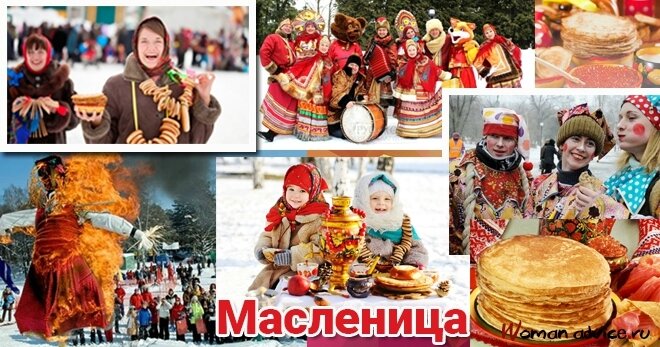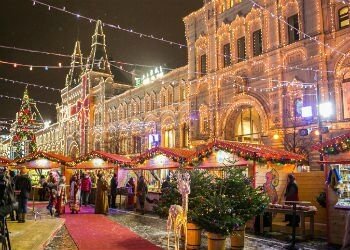National Celebrations
January
OLD NEW YEAR (СТАРЫЙ НОВЫЙ ГОД)
January 13th.
January 13, bears the oxymoron name of "old New Year". It is, indeed, the date of the new year in the old calendar. On this day, the Russians are cooking varenikis. It is a Slavic dish of unleavened dough stuffed with meat, potatoes, mushrooms, fruits, etc. But on this special occasion, we do not just eat simple varenikis, some of them are also stuffed with surprises supposed to deliver omens for the year to come: a varenik with a small piece of sugar will be a symbol of sweetness of to live, another with a woolen thread predicts a long journey, another with a piece is a good sign for the business to come ...
FEAST OF WATER BLESSING (КРЕЩЕНИЕ ГОСПОДНЕ)
January 19th.
That day, believers go to the church to get holy water. Traditionally, the Russians plunged into the water through ice holes blessed by priests to wash their souls of their sins.
NATIVITY OF CHRIST (РОЖДЕСТВО ХРИСТОВО)
Russian Christmas, January 7th.
The Julian calendar of the Russian Orthodox Church delaying 13 days on the Gregorian calendar, the Nativity of Christ is celebrated on January 7th. Introduced in Russia, in the 10th century, with Christianity, this festival was considered by the Orthodox Church as the second most important after Easter.
NEW YEAR (НОВЫЙ ГОД)
January 1st.
It was after a decree of Peter the Great, dated 1699, that Russia began to count the days from January 1st. The very European emperor of Russia had decided that his country should no longer be distinguished from other European countries by celebrating the transition to the New Year in early autumn. This pagan and peasant tradition, which wanted the year to begin at the same time as agricultural activities, was not completely forgotten. New Year's Day, even today, is the occasion of great family celebrations that keep the traces of the old customs plunging into the night of time and marked, until the Epiphany, by the quest for the spring sun: in the countryside, we light big bonfires in tribute to the sun. More generally, we gather around a tree and, after kissing on the mouth and saying the traditional S'novym godom ("New Year"), we eat and drink more than reason .
On January 2, also a holiday, children are honored; they discover under the tree the gifts of the Grandfather Gel and the Snow Queen. "
February
DAY OF THE DEFENDER OF HOMELAND (ДЕНЬ ЗАЩИТНИКА ОТЕЧЕСТВА)

February 23.
Not so long ago, it was the feast of the Soviet Army. It has become today the (non-free) holiday of Heroes and has spread to all men. All, especially young people and veterans, receive congratulations and gifts. Everywhere, at home, at work, in schools and universities, but mainly in military establishments, we gather around joyfully animated party meals.
March
FEAST OF THE WOMAN (МЕЖДУНАРОДНЫЙ ЖЕНСКИЙ ДЕНЬ)
8 March.
International Women's Day is very popular in Russia. As an institution of the Soviet calendar, this festival confirmed the equal rights of men and women in the homeland of the soviets. Even though it was very relative in fact. It is customary to invite his sweetheart to the restaurant, to splurge on a compliment beautifully shot, to take part in household chores and, above all, to offer flowers to all the women around him. Gentlemen, if you pay no attention that day, your career as Don Juan or ideal son-in-law will be over.
MASLENITSA (МАСЛЕНИЦА)

The week leading up to the Orthodox Great Lent, therefore, rather early in March but the dates vary each year.
Originally pagan times immemorial, it is the feast that celebrates the end of winter and the arrival of sunny days. Everywhere in Russia, all week long, we eat pancakes, we organize folk concerts, games, fairs, sleigh rides. This is the equivalent of Slavic Shrove Tuesday. But if this festival is linked to the religious calendar (it takes place the last week before the Great Lent), it is indeed of pagan source. A whole ritual is associated with him. We find ourselves in one of the forests close to the city, and we make a big fire around which we dance while watching a rag doll that represents the winter that we hunt and the spring that we are claiming. . The blinis that we eat are also loaded with symbols: cooked in butter (maslo), they gave the word maslenitsa, but, round and yellow as the sun, they also announce the return of spring.
April
EASTER (ПАСХА) For the Orthodox Church, this festival is the most important, it symbolizes the passage from death to life, from earth to heaven. Easter is celebrated on the first Sunday following the full moon of March 21st (March 21st if it is a Sunday), always after Passover.
For the Orthodox Church, this festival is the most important, it symbolizes the passage from death to life, from earth to heaven. Easter is celebrated on the first Sunday following the full moon of March 21st (March 21st if it is a Sunday), always after Passover.
May

Parade of May 9 celebrating the Victory Day of the Great Patriotic War (World War II). It continues to be celebrated, and it will be so until the traumatized generations and their descendants bear the memory of it. Commemorating the victory over Nazism during the Second World War, veterans wear their uniforms and decorations that day and gather in the squares, squares and parks of Russian towns and villages. The tradition of military parades on the occasion of Victory is reborn in the country. The flowers are blossomed with wreaths of carnations and fragrant plants, and the memory of the missing is honored. Fireworks illuminate the sky and fall on the earth in bunches of flowers.
September
MOSCOW FESTIVAL(ДЕНЬ ГОРОДА)
September 4th
Free concerts, fireworks, parades. The 850 years of Moscow had been the occasion of a great demonstration of the mayor of the time. 2018 is feverishly preparing for 871 years! As for every holiday celebrated by the city, the fireworks in Moscow are demented and to admire them at best, you can go to Park Pobedi, Vorobievi Gori, or on the Krymskiy most (Krymskiy bridge).
November
FESTIVAL OF RECONCILIATION (ДЕНЬ СОГЛАСИЯ И ПРИМИРЕНИЯ)
November 7th.
For seven decades, November 7 was the main holiday of three generations o
f Soviets: anniversary day of the October Revolution (the seizure of power by the Bolsheviks took place October 25, 1917, according to the Julian calendar then in force in Russia), it was celebrated with pomp and force military parades. It was on November 7, 1990 that the October Revolution was officially celebrated for the last time on the Red Square in Moscow; on this day, as every year, the Soviet Army marched at the same impeccable pace in front of the galleries of the Lenin Mausoleum occupied by Gorbachev, Yeltsin and Lukyanov (the Speaker of Parliament and the soul of the August 1991 coup) ). Today, the day is no longer a holiday and is mainly celebrated by the communists and nostalgic of the USSR of all kinds who meet and take the opportunity to release flags, slogans and vintage clothes worthy of the most beautiful hours Brejnevism.
Décembre
WINTER FESTIVAL "INVITATION FOR CHRISTMAS"(
ФЕСТИВАЛЬ РОЖДЕСТВО)

Usually 4 weeks between mid-December and mid-January.
This is the Christmas market period in Moscow! The Russian capital is bathed in lights and smiles of big and small.


/https%3A%2F%2Fstorage.canalblog.com%2F26%2F30%2F1579423%2F119895579_o.jpg)
/https%3A%2F%2Fstorage.canalblog.com%2F51%2F68%2F1579423%2F119895903_o.jpg)
/https%3A%2F%2Fstorage.canalblog.com%2F30%2F28%2F1579423%2F119261907.jpg)
/https%3A%2F%2Fstorage.canalblog.com%2F16%2F49%2F1579423%2F119895704_o.jpg)